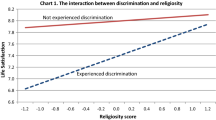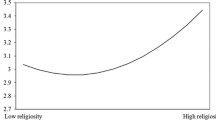Abstract
With only a few notable exceptions, studies on quality of life or general well-being have failed to deal with religiosity in general, and the development of more refined measures of religious meaning and belonging in particular. Data measuring subjective perceptions of well-being for various domains of life, including neighborhood, employment, work at home, education, friends, household members, marital status, standard of living, health and religion were used to form a number of domain scales. Relationships between the multidimensional concepts of well-being and religiosity are explored and the importance of religiosity in defining well-being is tested. Religious satisfaction was found to be important for general life satisfaction and existential well-being. Among the eight indicators and scales of religiosity, various combinations of religious satisfaction, frequency of prayer, prayer experience, and relationship with God, were important predictors of general life satisfaction, existential well-being, and overall happiness. Under no circumstance did any measure of religosity contribute to negative affect.
Similar content being viewed by others
References
Babbie, Earl: 1986, The Practice of Social Research (Wadsworth Pub. Co., Belmont, Calif.).
Bailey, Kenneth D.: 1982, Methods of Social Research (2nd Ed.) (The Free Press, New York).
Bellah, Robert N.: 1964, ‘Religious evolution’, American Sociological Review 29, pp. 358–374.
Berger Peter: 1967, The Sacred Canopy: Elements of a Sociological Theory of Religion (Doubleday, Garden City, N.Y.).
Bibby, Reginald W.: 1983, ‘Religionless christianity: a profile of religion in the Canadian 80s’, Social Indicators Research 13, pp. 1–16.
Campbell Angus, Philip Converse, and Willard R. Rogers: 1976, The Quality of American Life (Russel Sage Foundation, New York).
Cornwall Marie, Stan L. Albrecht, Perry H. Cunningham, and Brian L. Pitcher: 1986, ‘The dimensions of religiosity: a conceptual model with an empirical tests’, Review of Religious Research 27, 226–244.
Davidson, James D.: 1975, ‘Glock's model of religious commitment: assessing some different approaches and result’, Review of Religious Research 16, 83–93.
Diener, Ed.: 1984, ‘Subjective well-being’, Psychological Bulletin, Vol. 95, No. 3, pp. 542–575.
Emmons, Robert A. and Ed. Diener: 1984, ‘Factors predicting satisfaction judgments: a comparative examination’, Social Indicators Research 16' pp. 157–167.
Faulkner, Joseph E. and Gordon F. DeJong: 1969, ‘On measuring the religious variable: rejoinder to Weigert and Thomas’, Social Forces 48, 263–67.
Fukuyama Yoshio: 1961, ‘The major dimensions of church menbership’, Review of Religious Research 2, 154–61.
Gallup Report: 1985, Religion in America. 50 Years: 1935–1985. Report No. 236. (May).
Glock, Charles Y.: 1959, ‘The religious revival in America’, pp. 25–42 in Zohn, J. (ed), Religion and the Face of America (University Extensions, University of California, Berkeley).
Glock, Charles Y.: 1962, ‘On the study of religious commitment’, Religious Education 42, 98–110.
Glock, Charles Y. and Rodney Stark: 1965, ‘Religion and Society in Transition (Rand McNally and Company, Chicago).
Hadaway, Christopher Kirk: 1978, ‘Life satisfaction and religion: a reanalysis’, Social Forces 57 (December), pp. 636–641.
Hadaway, Christopher Kirk and Wade Clark Roof: 1978, ‘Religious commitment and the quality of life in American society’, Review of Religious Research, Vol. 19 No. 3 (Spring), pp. 295–307.
Headey, Bruce, Elsie Holmstrom and Alexander Wearing: 1983, ‘The impact of life events and changes in domain satisfactions on well-being’, Social Indicators Research 15, pp. 203–227.
Headey, Bruce, Tomasz Glowacki, Elsie Holmstrom and Alexander Wearing: 1985, ‘Modeling change in perceived quality of life (PQOL)’, Social Indicators Research 17, pp. 267–298.
Hood, Ralph W.: 1970, ‘Religious orientation and the report of religious experience’, Journal for the Scientific Study of Religion 9, 285–291.
Horley, James and Brian R. Little: 1985, ‘Affective and cognitive components of global subjective well-being measures’, Social Indicators Research 17, pp. 189–197.
King, Morton B.: 1967, ‘Measuring the religious variable: nine proposed dimensions’, Journal for the Scientific Study of Religion 6, 173–193.
King, Morton B. and Richard A. Hunt: 1969, ‘Measuring the religious variable: amended findings’, Journal for the Scientific Study of Religion 8, 321–23.
Klecka, William R. and Alfred J. Tuchfarber: 1978, ‘Random digit dialing: a comparison to personal surveys’, Public Opinion Quaterly 42, 105–114.
Lenski, Gerhard E.: 1961, The Religious Factor (Doubleday, Garden City, New York).
McClendon, McKee J. and David J. O'Brien: 1984, The Subjective Quality of Life in the Akron Area, 1982–83 (The University of Akron, Akron, OH 44325).
McNamara, Patrick H. and Arthur St. George: 1979, ‘Measures of religiosity and the quality of life: a critical analysis’, pp. 229–236 in David O. Moberg (ed.), Spiritual Well-Being: Sociological Perspectives (University Press of America, Washington, D.C.).
McNeil, J. Kevin, M. J. Stones, and Albert, Kozma: 1986, ‘Longitudinal variation in domain indicators of happiness’, Social Indicators Research 18, pp. 119–124.
Moberg, David O.: 1979, ‘The development of social indicators for quality of life research’, Sociological Analysis 40, pp. 11–26.
Moberg, David O.: 1984, ‘Subjective measures of spiritual well-being’, Review of Religious Research 25, pp. 351–364.
Moberg, David O. and Patricia M. Brusek: 1978, ‘Spiritual well-being: a neglected subject in quality of life research’, Social Indicators Research 5, pp. 303–323.
Petersen, Larry R. and Anita, Roy: 1985, ‘Religiosity, anxiety, and meaning and purpose’, Review of Religious Research, Vol, 27 No. 1 (September), pp. 49–62.
Roberts, Keith A.: 1984, Religion in Sociological Perspective (The Dorsey Press, Homewood, Ill.).
Sasaki, Masamichi and Tatsuzo, Suzuki: 1987, ‘Changes in religious commitment in the United States, Holland and Japan’, American Journal of Sociology 92, 1055–1076.
Schuessler, K. F. and G. A. Fisher: 1985, ‘Quality of life research and sociology’, pp. 129–149 in Annual Review of Sociology (Annual Reviews Inc., Palo Alto, Calif.).
Willits, Fern K. and Donald M. Crider: 1988, ‘Religion and well-being: men and women in the middle years’, Review of Religious Research 29, 281–294.
Witter, Robert A., William A. Stock, Morris A. Okun, and Marilyn J. Haring: 1985, ‘Religion and subjective well-being in adulthood: a quantitative synthesis’, Review of Religious Researach, Vol. 26 No. 4, pp. 332–342.
Yinger, J. Milton: 1970, The Scientific Study of Religion (MacMillan Co., London).
Author information
Authors and Affiliations
Additional information
We would like to thank McKee J. McClendon for his comments on an earlier version of this paper and for his work in directing the Akron Area Survey, and Jim Quane and Peri-Marie Todd for their computer work.
Rights and permissions
About this article
Cite this article
Poloma, M.M., Pendleton, B.F. Religious domains and general well-being. Soc Indic Res 22, 255–276 (1990). https://doi.org/10.1007/BF00301101
Received:
Issue Date:
DOI: https://doi.org/10.1007/BF00301101




